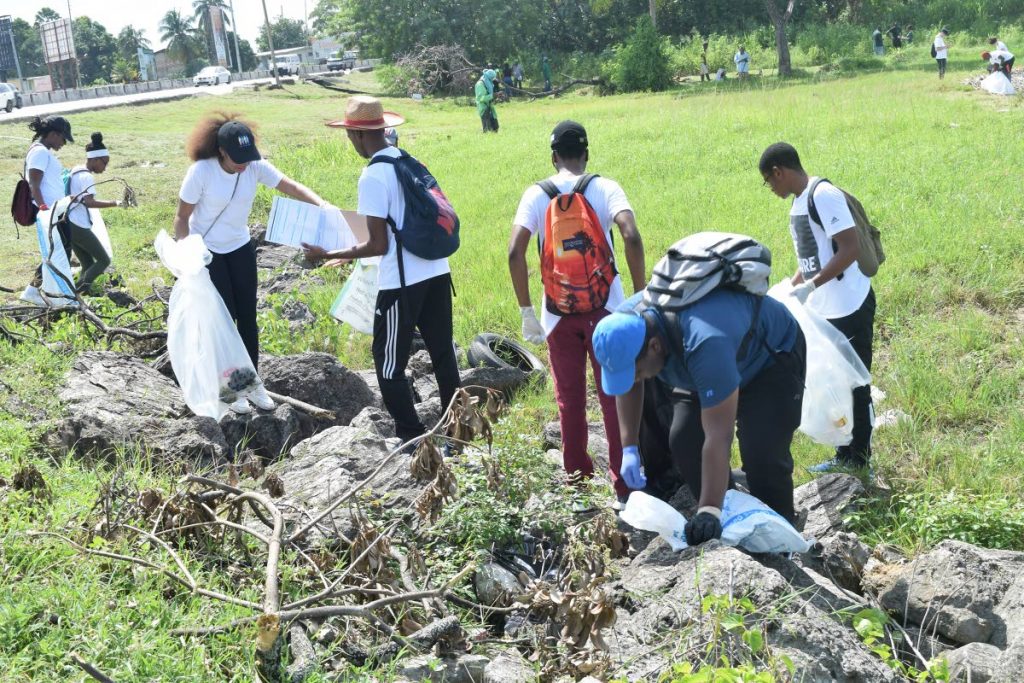Volunteers clean up Foreshore

About 2,090 pounds of garbage was collected during two hours at the Foreshore along the Audrey Jeffers Highway yesterday.
Approximately 220 volunteers participated in the International Coastal Cleanup 2019 at the 0.34 kilometres of Foreshore, organised by the Ministry of Planning and Development in collaboration with the Delegation of the European Union of TT.
Yesterday, and today in Tobago, over 20 sites were cleaned in Trinidad and about eight in Tobago. There organisations collected data on the amount of glass, plastics and miscellaneous garbage at coasts throughout the country.
Keima Gardiner, Waste Management Specialist with the Ministry of Planning explained that the clean up was held on the third Saturday of September every year and was spearheaded by the Caribbean Network for Integrated Rural Development and the National Planning Committee.
Gardiner said in addition to the Foreshore, volunteers intended to go around the peninsula closer to the river mouth where usually has many plastic bags and bottles. “Last year when we did the clean up on this very site we collected about 100 tyres so we are expecting similar results today. We hope it’s not as many because we’d like to think the work we did last year accounted for something.”
Ambassador of the EU for TT, Aad Biesebroek stressed that plastic pollution is an international problem so EU supports and promotes similar initiatives in partnership with local authorities around the world.
“I think it’s an extremely important exercise because plastic pollution has become such a big problem. Millions of tonnes of plastic end up in the ocean every year and it’s getting worse and worse. We had an enormous floating plastic island in the ocean and nobody knows how to deal with it.”
He said the Caribbean was one of the top polluters per capita so these types of initiatives were important as it created more awareness about the severity of the problem, and helped governments think about the underlying causes. “Perhaps governments can also think about single-use plastics. Do we really need it? Are there other ways of providing tools that we can use? So it helps create that awareness both for the public and government alike.”
He said the EU also tries to promote discussions about climate change and the need to take climate action. He said policies to support such often took a long time because many investments in traditional ways of creating energy were made over the years. Therefore change was a gradual process.
“One of the things we try to involve others in is a dialogue on the generation of electricity. At the moment electricity is generated by burning gas, which is a fossil fuel. There are other ways of generating electricity - solar, wind – so we try to promote dialogue with the government on those issues. We provide technical assistance to help the government develop some economic modelling to understand whether financially it makes sense.”
Many other organisations joined in the clean up including the Community Environment Enhancement and Protection Programme (CEPEP), the Civilian Conservation Corps, Vemco, and Rand Credit Union.
CEPEP general manager Keith Eddy explained that the organisation participated yesterday as part of their own coastal clean up initiative which started three months ago. He said once a month a beach is chosen and yesterday their efforts happened to fall on International Coastal Cleanup 2019.
He said they usually cut the grass around the area and picked up any debris not organic including plastics and styrofoam. He said usually they did not separate the garbage but would do so this time according to International Coastal Cleanup regulations.


Comments
"Volunteers clean up Foreshore"